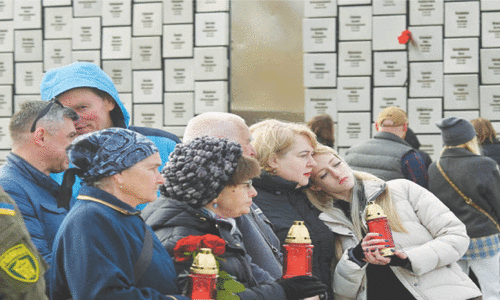ISLAMABAD: The second day of the Pakistan Coalition of Ethical Journalism’s annual meeting saw animated and heated discussion around the role of journalists’ unions, problems with regional and local media as well as the changing face of journalism and the need for academia to adapt to changing times.
In the first session, representatives from regional media outlets outlined the challenges they faced. Talking about the state of the Pashto press in Khyber Pakhtunkhwa, Peshawar Press Club General Secretary Fida Adeel said that there were only four Pashto-language newspapers, none of which were circulated outside the Peshawar valley.
“These newspapers, which include Wahdat, Khabroona and Shahadat – which is a publication of the Hizb-i-Islami Afghanistan – are not very accessible for Pashto speakers because of a difference in dialect and also because they target Afghan refugees living in Pakistan,” he said.
Mr Adeel also said that AVT Khyber was the dominant Pashto-language TV network, by virtue of being the only player. He said that another recent channel, Pashto 1, had a very short life as it was bought out by the AVT group, ostensibly because it threatened their monopoly.
Veteran editor Nazir Leghari also chimed in, saying that the print media didn’t cover people’s real issues, which could probably explain why newspaper circulation figures in a country of 180 million people were still dismally low.
He also quoted the example of Rohi TV, which he said was one of the best Seraiki language channels in the country until it was forced to shut down.
Unions, regional media and changing face of journalism discussed on 2nd of PCEJ conference
According to Mr Leghari, the channel’s demise was down to mismanagement by the channel’s financier, Jahangir Tareen. However, other audience members who had worked at Rohi TV pointed out that the channel employed a disproportionately large number of non-Seraiki speakers, who did not understand the nuance or the cultural significance of Seraiki culture and the language.
Quetta-based journalist Saleem Shahid told the audience that apart from a handful of Balochi, Brahvi and Pashto magazines that covered local issues, most of the press in Balochistan regurgitated the same stories that the national press carried.
This prompted former Pakistan Federal Union of Journalists’ secretary general Mazhar Abbas to say that the term ‘national media’ should not simply apply to the larger Urdu language media outlets, but should refer to media in all languages around the country.
He said that a dearth of community-oriented media – such as FM stations and regional newspapers – meant that no one carried the kind of localised news that people outside the major urban centres were interested in reading.
Mr Abbas was then accosted by a number of journalists, including PFUJ’s Khursheed Abbasi, who questioned him on the role of unions in securing rights for journalists.
However, Mr Abbas chided them for their lack of information and pointed out that the PFUJ had raised its voice to secure the rights of journalists and media professionals over working conditions, job security and non-payment of dues.
Then, Asad Baig of Media Matters for Democracy invoked the ire of certain academics when he said during a discussion on J-Ethinomics – which is a concept that seeks to reconcile journalistic ethics with economic incentives – that the curriculum at Mass Communication departments of most universities was quite out of touch with ground realities.
However, Mazhar Abbas defended Mr Baig’s assertion, saying that even as an alumnus of the Karachi University (KU), he was appalled at the standards of instruction at his alma mater’s journalism department.
This view was also endorsed by a member of the KU faculty present on the occasion, who agreed that there was a need to update university curricula to reflect the changing times.
In the final session of the day, media development professional Adnan Rehmat and digital rights activist Nighat Dad stressed the need to embrace and understand the digital media realm, with all its pitfalls and caveats.
Ms Dad pointed out that the Internet and social media was still a private space for individuals and should not be regulated.
However, she stressed the need for journalists to be cautious with what they said online and said that their remarks on social media forums should also be subject to the same rigorous editorial checks that they submit to when reporting for their respective organisations.
Published in Dawn January 31st, 2015
On a mobile phone? Get the Dawn Mobile App: Apple Store | Google Play













































